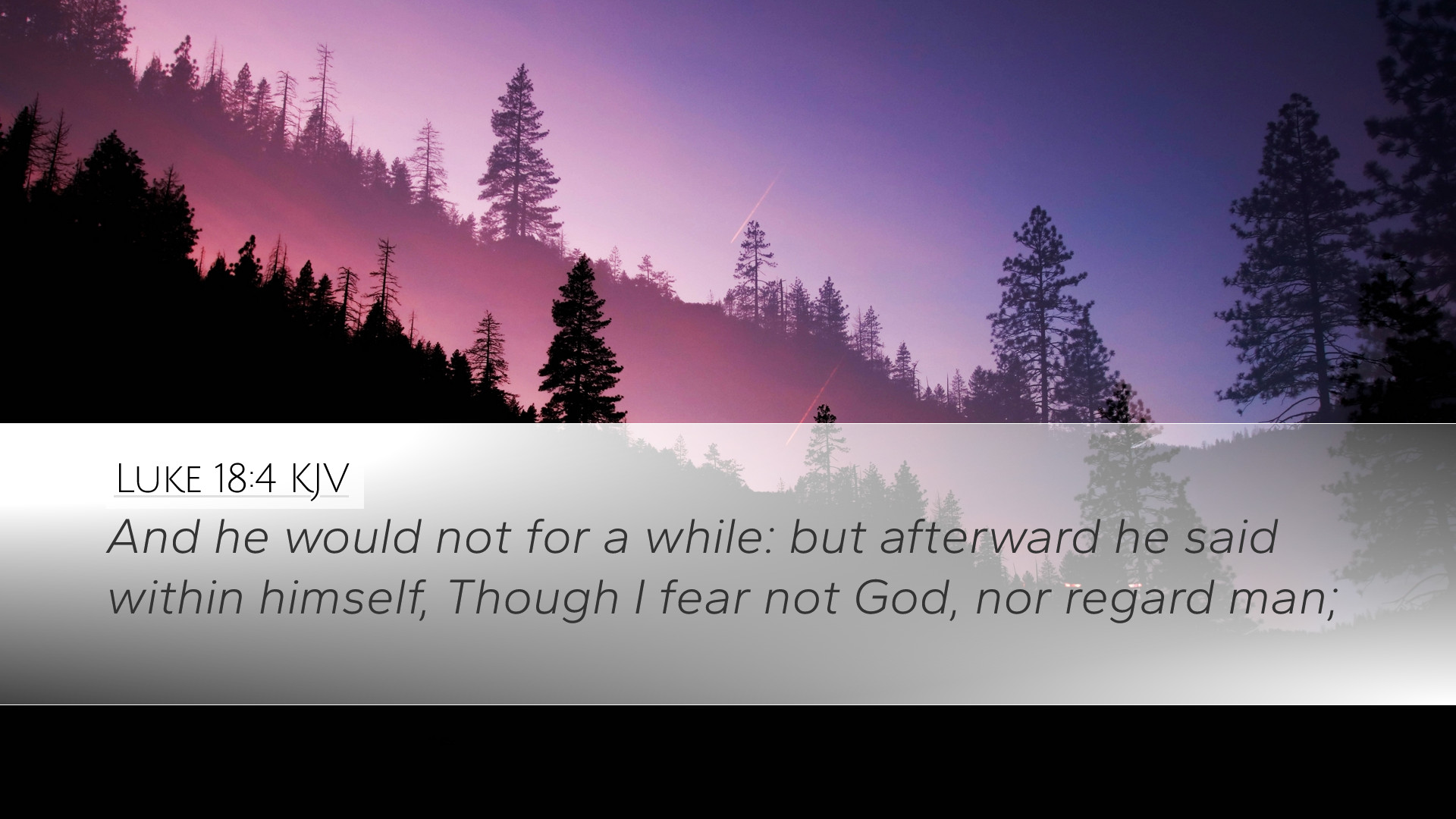Commentary on Luke 18:4
Luke 18:4 (KJV): "And he would not for a while: but afterward he said within himself, Though I fear not God, nor regard man;"
Contextual Analysis
In this passage, we find ourselves within a parable Jesus tells about the persistent widow and the unjust judge. The widow's relentless appeal to the judge serves as an illustration of the need for persistence in prayer. The setting emphasizes the attributes of God versus the characteristics of an unjust human judge, highlighting the assurance believers can have in their relationship with God.
Insights from Matthew Henry
Matthew Henry states that the unjust judge represents those whose hearts are hardened against pleas of justice and mercy. This judge initially refuses to hear the widow’s case; however, his eventual decision is motivated by the widow's determination rather than any sense of justice or fear of God. Henry draws attention to the widow's persistence, which indicates the power of unwavering faith and relentless prayer.
Henry also emphasizes the importance of this parable, commenting on God’s willingness to hear the cries of His people. He compares the widow’s perseverance to believers' need for continuous prayer: “If the prayer of a poor widow could prevail with an unjust judge, how much more shall our prayers prevail with a just God?”
Insights from Albert Barnes
Albert Barnes elaborates on the character of the judge in this verse, noting the moral depravity that enables him to disregard both God and man. Barnes highlights the contrast between earthly judges, who may be influenced by self-interest or authority, and God, who is utterly just and faithful. This parable serves to encourage believers that God will not act like the unjust judge. He interprets the phrase “Though I fear not God” as a clear revelation of the judge’s character, providing insight into his lack of moral compass.
Barnes concludes that the parable illustrates a certainty: God will avenge His people who cry out to Him. It encourages believers to trust in God’s righteousness and timing, reminding us that God's justice will ultimately prevail.
Insights from Adam Clarke
Adam Clarke provides a significant theological perspective on the meaning of the judge's reluctance. Clarke argues that this unwillingness for a while signifies not only the judge's earthly nature but also reflects a deep spiritual truth—often, believers may feel their prayers go unheard due to perceived silence from God. The judge’s eventual acquiescence serves to reaffirm the theological principle that persistence in faith is rewarded.
Clarke encourages believers not to lose heart. He emphasizes the role of sustained prayer in the life of a believer, reflecting how God values faithful prayer. The notion that God’s delay is not an indication of indifference, but rather part of His perfect timing, resonates through Clarke’s analysis.
Theological Implications
This verse, alongside the surrounding context, bears profound theological implications:
- The Nature of God: God hears and responds to the cries of His people much more readily than a flawed judge would.
- Persistence in Prayer: The call for perseverance in prayer is a central theme within this parable, encouraging believers never to give up hope.
- Justice and Mercy: The passage reveals the tension between divine justice and mercy, showing that God, while just, can be merciful and forgiving.
- Faithfulness of God: The assurance that God is faithful and will deliver justice provides comfort to believers amidst struggles.
Conclusion
Luke 18:4, as part of the parable of the persistent widow, emphasizes the importance of persevering in prayer and trusting in God’s character as a just judge. The insights from Matthew Henry, Albert Barnes, and Adam Clarke converge on the message that persistent faith is essential and that God will ultimately take action for His people.
This passage serves as a source of encouragement for pastors, students, and theologians alike, reminding them that through unwavering dialogue with God, believers can invoke His promises and His justice, irrespective of earthly circumstances.


